 |
 |
|
The Three Times You Should Punish Your Horse
by Ron Meredith
President, Meredith Manor International Equestrian Centre
If you've ever taken riding lessons, you can relate to your horse when it comes to being corrected
for something you didn't do quite right. Maybe the instructor just got a little sarcastic. Or maybe she
raised things to the level of a good scold. Maybe you messed up big time and got yelled at big time. Or maybe to prove her point about what you did wrong, the instructor got really stern and made
you do whatever it was over and over and over to drill it into your head.
Whatever happened, as the instructor got louder or pushier or stricter you probably didn't feel very
good about what you were doing. Your first reaction was probably a knot in your stomach. Or you got nervous or afraid or grumpy or mad or resentful. Even if you knew you earned the dressing
down you got, going through it didn't make you feel very good about riding that day. Worst of all,
you probably didn't learn much of anything except that going back into the arena with that instructor
wasn't something you were looking forward to. That's why we teach our students that there are three times you punish a horse for doing something wrong – never, never
and never.
The first goal in every training session is to make the horse feel positive about himself and the whole
experience he has when he's with you. Heeding teaches handlers to concentrate on their horse, to
methodically apply horse logical pressures only to the point where they shape the horse's behavior,
then to consistently apply and release and reapply those pressures to shape and direct every stride the horse takes. When everything is horse logical and no more than one step away from something
he already knows, the horse learns to trust that nothing bad is going to happen when he's around
you. That trust leads to relaxation. And relaxation and rhythm are the foundations for anything you're going to teach a horse.
When a pressure gets "louder" either physically or psychologically, the horse feels that as something
he wants to escape from. Whenever he's running away from a pressure, the horse is not learning.
Whenever his current rhythm is abruptly interrupted, he is not learning. So if you jerk on a lead rope
, make a sudden move around his head, yank on the reins, kick him in the side, smack him with a
crop or gig him with a spur as "punishment" for something he didn't do right, the only the thing horse
has learned is that it's not safe to be around you. His trust goes away. Any positive feelings about the training session get canceled by that breach of trust.
Remember that you have to show the horse what you want him to do before you can ask him to do
it. You reward any tiny move in the right direction. You don't punish wrong moves, you just ignore them. You simply go back to showing him what you want. Go back to something he already knows
and can be successful at. Then ask again. If you get what you wanted, stroke him or scratch him
and let him know how pleasant the whole thing was. If you don't get it, just stay calm, stay positive and start showing him again.
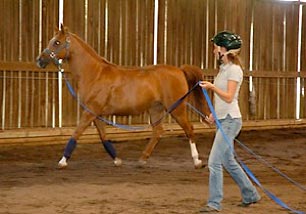 Once you can ask the horse to do something
and get it consistently, now you can tell him to do it by just beginning the feel of a full corridor of aids. Only when the horse reaches this stage
can you enforce your asking. Here's where things get a little tricky. You have to enforce what you've asked in a way that the horse does not feel as punishment. Enforcement means re
-enforcing something the horse already knows, re-minding or re-focusing his attention. That's a different attitude than correcting the horse because he's gone wrong. Once you can ask the horse to do something
and get it consistently, now you can tell him to do it by just beginning the feel of a full corridor of aids. Only when the horse reaches this stage
can you enforce your asking. Here's where things get a little tricky. You have to enforce what you've asked in a way that the horse does not feel as punishment. Enforcement means re
-enforcing something the horse already knows, re-minding or re-focusing his attention. That's a different attitude than correcting the horse because he's gone wrong.
When any one part of a corridor of aids gets too loud, it destroys the feel of the full corridor. A corridor of individual aids gives the horse a message about how you want him to shape the next
stride just like a sentence made up of individual words tells your buddy what you want him to do. If
you start a sentence then wind up yelling just one word, that one loud word drowns out the meaning of all the rest.
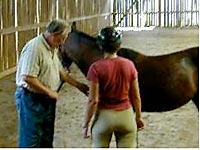 Enforcement means emphasizing one of your aids just enough to
remind the horse of the shape you're asking for without raising his excitement level to the point where you drown out all the rest of
the corridor. Maybe you've asked for the horse to work in a straight line in a particular rhythm as he approaches a jump. You
have him in a corridor of aids that includes your seat bones, your hands and your legs but as he gets closer to the jump you feel
him starting to belly out to the right. You could put just a little more pressure on that right seat bone to ask him to correct his bend or you could squeeze just a
little more with the right leg or you could just touch him with your right spur to re-enforce or re-mind him that he's in a corridor that's straight. Enforcement means emphasizing one of your aids just enough to
remind the horse of the shape you're asking for without raising his excitement level to the point where you drown out all the rest of
the corridor. Maybe you've asked for the horse to work in a straight line in a particular rhythm as he approaches a jump. You
have him in a corridor of aids that includes your seat bones, your hands and your legs but as he gets closer to the jump you feel
him starting to belly out to the right. You could put just a little more pressure on that right seat bone to ask him to correct his bend or you could squeeze just a
little more with the right leg or you could just touch him with your right spur to re-enforce or re-mind him that he's in a corridor that's straight.
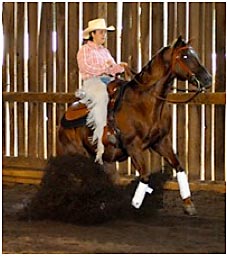 If your enforcement focuses the horse's attention on a single
aid or pressure within the whole corridor of pressures that's creating the feel of the shape you want him to take so that he forgets about all the rest, your aid--your rein, your seat bone
, your leg, your crop, your spur--was too "loud." Punishment doesn't remind the horse of the shape you're asking for. It
slaps him to attention to that one aid and makes him forget all about the rest of the things shaping the corridor. Worst of all, it changes his thinking about whether or not going back
into the arena with you is something he's going to look forward to the next time. If your enforcement focuses the horse's attention on a single
aid or pressure within the whole corridor of pressures that's creating the feel of the shape you want him to take so that he forgets about all the rest, your aid--your rein, your seat bone
, your leg, your crop, your spur--was too "loud." Punishment doesn't remind the horse of the shape you're asking for. It
slaps him to attention to that one aid and makes him forget all about the rest of the things shaping the corridor. Worst of all, it changes his thinking about whether or not going back
into the arena with you is something he's going to look forward to the next time.
Training is a matter of making the horse feel positive and
comfortable when he takes the shapes you direct at every stride. When he doesn’t there are three times you punish him for that--never, never, and never.
So here at Meredith Manor, when a horse doesn't get the shape right or misses it for a stride or
two, there are three times he'll get punished--never, never, and never. And the three times
instructors are allowed to yell at a riding student are never, never, and never. What's good for horses is good for people, too.
Meredith Manor International Equestrian Centre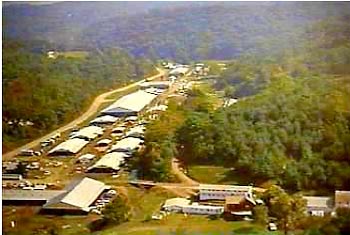
Meredith Manor is an equestrian career college dedicated entirely to producing professional riders, trainers, instructors, and farriers for the horse industry. All
programs and courses are designed specifically to prepare you for a successful equine career. Our programs range in length from 3 to 18 months, and our students spend 6 hours a day in
primarily hands-on, skill based classes with additional time spent in the barns and with the horses. Students don't have to excel in academic, classroom
based classes to be successful in our programs, but they must have a passion for horses and a dedication to having a successful equestrian career.
Meredith Manor's name and reputation are known by serious horse people throughout the world. Students from the ages of seventeen to sixty-three have attended the School from every state and
many foreign countries. Meredith Manor strives to provide a climate of learning in which each student may identify and accomplish his or her goals. We have continuously researched the horse
industry, designed the facilities, and developed the educational programs that will give our students
the training, experience, and confidence needed to have successful, life-long careers with horses!
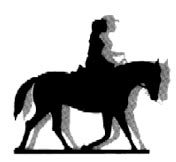 Ron Meredith has over forty years' experience as president of the
school and has developed it from its humble beginnings of six students in 1963 to its current world class level. Because of his outstanding
contributions to the horse industry and specifically to equestrian education, he has received a number of distinctive recognitions
including an Honorary Doctorate of Equestrian Studies. Dr. Meredith has held seven AHSA judges' cards and has trained top level horses and riders in the cutting and reining world. Ron Meredith has over forty years' experience as president of the
school and has developed it from its humble beginnings of six students in 1963 to its current world class level. Because of his outstanding
contributions to the horse industry and specifically to equestrian education, he has received a number of distinctive recognitions
including an Honorary Doctorate of Equestrian Studies. Dr. Meredith has held seven AHSA judges' cards and has trained top level horses and riders in the cutting and reining world.
Contact: Meredith Manor International Equestrian Centre
147 Saddle Lane
Waverly, West Virginia 26184
Phone: 800-679-2603
Email: info@meredithmanor.edu
Website: www.meredithmanor.edu
|
 |
|
To advertise your horse product or service, contact Ann
|
 |
|
InfoHorse.com, Horse Information Lives Here ® 4/19/2024
Contact Us to Advertise to over a million Horse Owners.
All images and content Copyright© 2012 by InfoHorse.com, Equusite.com.
Horse Owners are Dog Owners; Dog Product Information dognowner.com
|
|
|
Articles, Academic Schools, Arena Maintenance, Animal Communicators, Barns, Barn and Accessories, Barn Equipment and Tractors, Breast Collars, Grooming Products for Horses, Hay Feeders, Horse Blankets, Horse Books, Horse Videos, Horse Breeders, Horse Camping Gear, Career Schools, Carts and Buggies, Horse Training Clinicians, Equestrian Clothing, Dogs and Puppies, Horse Fencing, Western Art & Furniture, Horse Property for Sale, Horse Products For Sale, Fly Control, Foal Care, Horse Footings, Horse Gifts, Horse Health and Nutrition, Hoof and Leg, Horse Insurance, John Lyons Certified Trainers, Equine Lawyers, Leather Care, Links, Horse Property, Horse Photography, Portable Horse Stalls, Arenas and Roundpens, Horse Riding Schools, Horse Schools, Safety Products, Services for Horses, Horse Trailers, Horse Shipping, Horse Skin Coat Care, Horse Software, Specialty Trainers, Horse Summer Camps, Tack, Horse Trainers, Treats and Snacks, Truck Accessories, Trucks, Horse Vacations, Western Lifestyle, jewelry
|
|
|
|